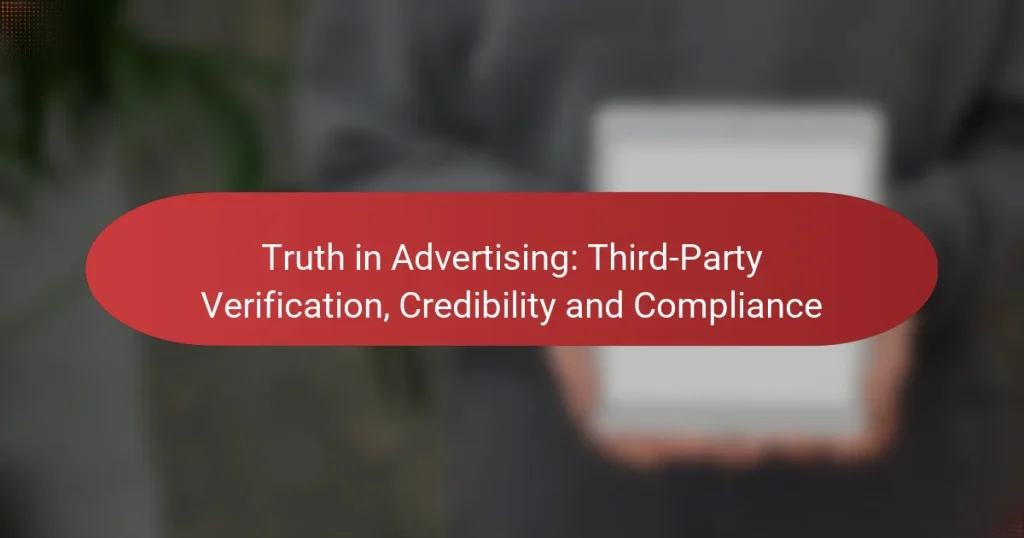Truth in advertising is essential for maintaining consumer trust and ensuring fair competition in the marketplace. In South Africa, businesses must substantiate key advertising claims—such as health, performance, and environmental assertions—with credible evidence to avoid misleading consumers. Adhering to legal guidelines and conducting thorough research not only protects companies from legal repercussions but also fosters a transparent relationship with their audience.
Truth in Advertising: Preparation Strategies, Challenges and Claim Defense
Truth in Advertising: Data-Driven Approaches, Credibility and Consumer Trust
Truth in Advertising: Scientific Evidence, Claim Validation and Credibility
Truth in Advertising: Verification Tools, Digital Advertising and Claim Accuracy
Truth in Advertising: Customer Research, Claim Support and Market Insights
Truth in Advertising: Comparative Analysis, Competitor Claims and Market Positioning
What are the key advertising claims in South Africa?
In South Africa, key advertising claims include health claims, performance claims, and environmental claims. These claims must be substantiated with evidence to ensure they are not misleading to consumers.
Health claims
Health claims refer to statements that suggest a product can influence health or well-being. In South Africa, these claims must comply with the Foodstuffs, Cosmetics and Disinfectants Act, which requires scientific evidence to support any health-related assertions.
For example, a product claiming to lower cholesterol must have clinical studies backing this statement. Consumers should look for certifications or approvals from relevant health authorities to verify such claims.
Performance claims
Performance claims highlight the effectiveness or superiority of a product in comparison to competitors. These claims should be based on reliable testing and must not exaggerate the product’s capabilities.
For instance, a cleaning product that claims to remove 99% of bacteria should provide evidence from independent tests. It’s essential for consumers to be cautious and seek out third-party validation of these performance assertions.
Environmental claims
Environmental claims indicate a product’s sustainability or eco-friendliness. In South Africa, these claims are regulated to prevent greenwashing, which is when a product is falsely marketed as environmentally friendly.
Examples include claims about recyclable packaging or reduced carbon footprint. Consumers should look for recognized eco-labels or certifications to ensure the authenticity of these environmental claims.
How can businesses ensure truth in advertising?
Businesses can ensure truth in advertising by conducting thorough research and adhering to legal guidelines. This approach helps them create accurate claims that are substantiated by evidence, reducing the risk of misleading consumers.
Conducting thorough research
Thorough research involves gathering reliable data to support advertising claims. Businesses should utilize credible sources, such as scientific studies, expert opinions, or industry reports, to validate their statements. For example, if a company claims its product improves health, it should reference clinical trials or expert endorsements.
Additionally, businesses should consider the context of their claims. Understanding the target audience and market trends can help tailor messages that resonate while remaining truthful. Regularly reviewing and updating research is essential to maintain accuracy over time.
Utilizing legal guidelines
Adhering to legal guidelines is crucial for ensuring truth in advertising. In the United States, the Federal Trade Commission (FTC) enforces regulations that require advertisements to be truthful and not misleading. Companies should familiarize themselves with these regulations to avoid potential legal issues.
To comply with legal standards, businesses should implement a review process for all advertising materials. This process can include checks for accuracy, substantiation of claims, and ensuring that any disclaimers or qualifications are clearly presented. Regular training for marketing teams on legal requirements can further enhance compliance.
What are the consequences of false advertising in South Africa?
False advertising in South Africa can lead to significant legal and reputational consequences for businesses. Companies may face penalties, lawsuits, and a loss of consumer trust, which can severely impact their market position.
Legal penalties
In South Africa, false advertising is governed by the Consumer Protection Act and the Advertising Standards Authority. Violators can face fines, orders to retract misleading advertisements, and potential civil lawsuits from affected consumers or competitors.
Penalties for false advertising can vary widely, with fines potentially reaching hundreds of thousands of rand depending on the severity of the violation. Businesses should ensure compliance with advertising regulations to avoid these costly repercussions.
Reputation damage
False advertising can severely damage a company’s reputation, leading to a loss of customer trust and loyalty. Once consumers perceive a brand as dishonest, it can take considerable time and effort to rebuild that trust.
Negative publicity from false claims can spread quickly through social media and word-of-mouth, amplifying the impact on a company’s image. To mitigate reputation damage, businesses should prioritize transparency and honesty in their advertising practices.
What evidence supports advertising claims?
Advertising claims are often supported by various forms of evidence, including scientific studies and consumer testimonials. These types of evidence help establish credibility and can influence consumer trust and purchasing decisions.
Scientific studies
Scientific studies provide empirical evidence that can validate advertising claims. These studies typically involve controlled experiments or observational research that measure the effectiveness or benefits of a product. For instance, a skincare brand may cite clinical trials demonstrating that its cream reduces wrinkles by a certain percentage over a specified period.
When evaluating scientific studies, consider the sample size, methodology, and whether the research has been peer-reviewed. Claims backed by large, well-designed studies tend to be more reliable. However, be cautious of studies funded by the companies that produce the products, as this can introduce bias.
Consumer testimonials
Consumer testimonials offer personal accounts of experiences with a product, often highlighting its benefits or effectiveness. These testimonials can be powerful, as they reflect real-life usage and satisfaction. For example, a weight loss program might feature success stories from individuals who achieved their goals using the program.
While testimonials can be persuasive, they should be viewed critically. Look for a range of reviews to get a balanced perspective, and be wary of overly positive or exaggerated claims. Authentic testimonials often include specific details about the user’s experience, making them more credible.
How do regulatory bodies oversee advertising claims?
Regulatory bodies oversee advertising claims by establishing guidelines and standards that ensure truthfulness and prevent misleading information. They monitor advertisements, investigate complaints, and enforce compliance through penalties or corrective actions.
Advertising Standards Authority of South Africa
The Advertising Standards Authority of South Africa (ASA) is responsible for regulating advertising practices in the country. It operates a self-regulatory system that allows consumers and competitors to lodge complaints about misleading or harmful advertisements.
ASA’s Code of Advertising Practice outlines the principles that advertisers must follow, including honesty, fairness, and social responsibility. Advertisers should ensure their claims are substantiated and not misleading to avoid sanctions.
Consumer Protection Act
The Consumer Protection Act (CPA) in South Africa provides a legal framework to protect consumers from unfair marketing practices. It prohibits false or misleading representations about goods and services, ensuring that advertising claims are accurate and verifiable.
Under the CPA, consumers have the right to seek redress for misleading advertising, which can include refunds or replacements. Businesses must be cautious to comply with these regulations to maintain consumer trust and avoid legal repercussions.
What are the best practices for making truthful advertising claims?
Best practices for truthful advertising claims involve ensuring clarity, accuracy, and compliance with relevant regulations. Advertisers should provide evidence to support their claims and avoid misleading language that could confuse consumers.
Clear and accurate messaging
Clear and accurate messaging is essential for maintaining consumer trust. Advertisers should use straightforward language that accurately reflects the product or service being offered. Avoid vague terms and ensure that any claims made can be substantiated with evidence.
For example, instead of stating “the best product,” specify what makes it superior, such as “the highest customer satisfaction rating in its category.” This approach not only enhances credibility but also helps consumers make informed decisions.
Regular audits of advertising content
Conducting regular audits of advertising content helps ensure ongoing compliance with truth-in-advertising standards. These audits should assess both the accuracy of claims and the clarity of messaging. Regular reviews can identify any misleading statements or outdated claims that need correction.
Establish a schedule for audits, such as quarterly or bi-annually, and involve cross-functional teams to provide diverse perspectives. This proactive approach minimizes the risk of legal issues and enhances brand reputation by demonstrating a commitment to honesty in advertising.
How can consumers identify misleading advertising?
Consumers can identify misleading advertising by critically evaluating claims and seeking evidence to support them. Key indicators include vague language, exaggerated benefits, and lack of substantiation.
Look for vague language
Advertisements that use ambiguous terms like “best,” “greatest,” or “revolutionary” often lack concrete evidence. These terms can mislead consumers into believing a product is superior without providing any factual basis.
To assess claims, ask for specifics. For example, instead of “the best pain relief,” look for details about the ingredients, studies, or user testimonials that support the claim.
Check for evidence
Reliable advertisements should provide verifiable evidence for their claims. This can include clinical studies, expert endorsements, or customer reviews. If an ad lacks such evidence, it may be misleading.
Consumers should seek third-party reviews or research to validate claims. For instance, if a weight loss product promises significant results, check if there are independent studies backing those results.
Be cautious of exaggerated benefits
Exaggerated benefits can be a red flag for misleading advertising. Claims that a product can cure diseases or provide miraculous results are often unfounded and should be approached with skepticism.
Consider the plausibility of the benefits. If a product claims to deliver results that seem too good to be true, it likely is. Look for realistic expectations and testimonials from actual users.
Understand regulatory standards
Familiarizing yourself with advertising regulations can help identify misleading claims. In many countries, including the U.S. and EU nations, there are strict guidelines that require truthfulness in advertising.
For example, in the U.S., the Federal Trade Commission (FTC) enforces rules against deceptive advertising. Understanding these regulations can empower consumers to challenge misleading claims effectively.






